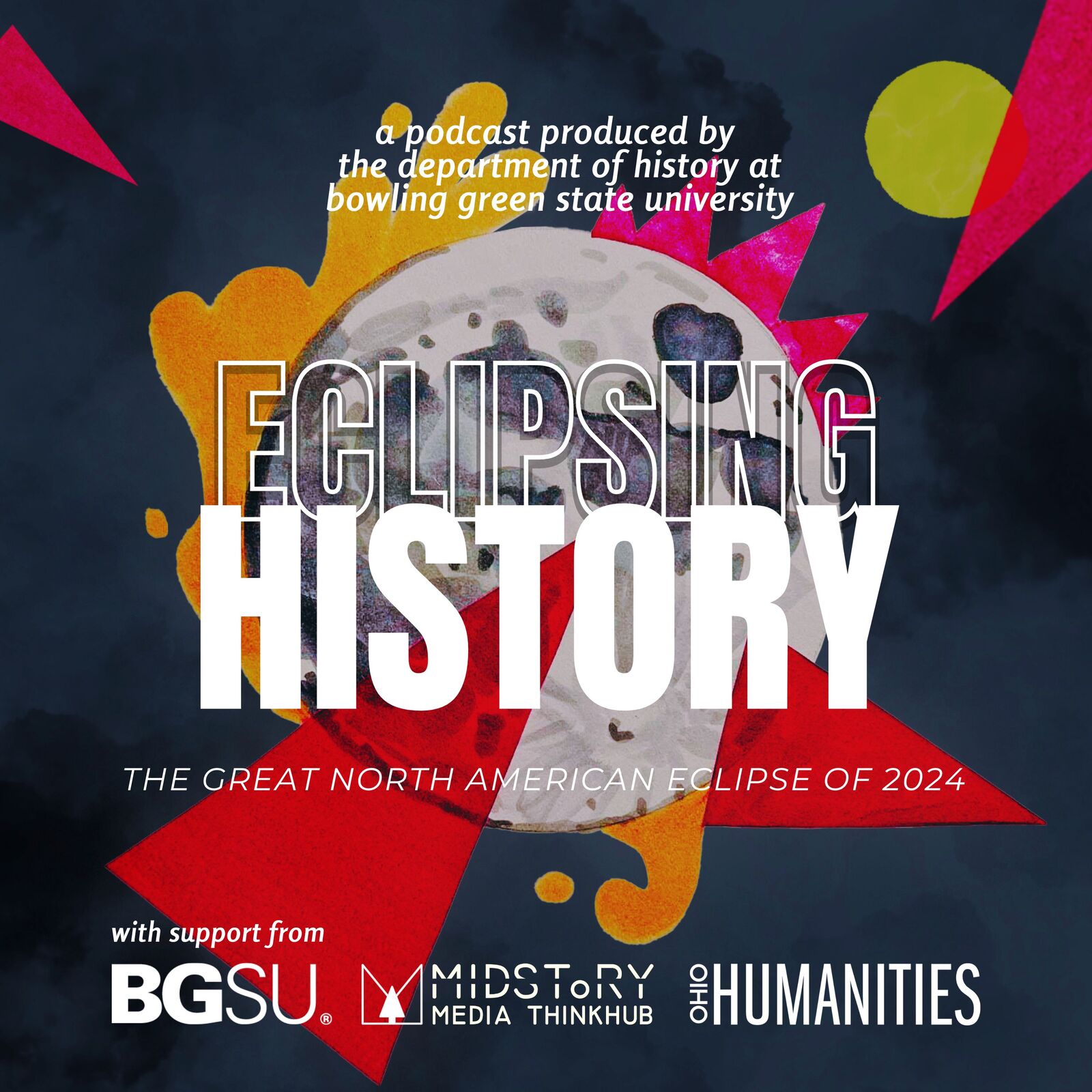Browse Items (34 total)
-
Episode 3: Written in the Stars
Episode 3 delves into the fields of ethnoastronomy and archaeoastronomy to explore how the Indigenous Nations of North America understood the stars from ancient times to the present. With a focus on the Mound Builders of Ohio, we explore the continuities of astronomical knowledge from past to present, interviewing both Tribal members and academic experts about how they see the connections between ancient and present peoples of North America. Finally, we highlight the astronomical traditions of the Myaamia, the Shawnee, the Au’Dam, and others, exploring their shared connections and crucial differences. This episode was created by Emily Shaver Kay, Bekah Shively, and Burkart with input from Dr. Amílcar Challú and Dr. Cheryl X. Dong. Landon Cina from the BGSU College of Musical Arts provided the music and Midstory edited the final episodes. This podcast is made possible, in part, by Ohio Humanities and the National Endowment for the Humanities. Any views, findings, conclusions or recommendations expressed in this podcast do not necessarily represent those of Ohio Humanities or the National Endowment for the Humanities. -
Episode 2: Eclipses and Power
Episode 2 explores the relationship between eclipses and the power that different peoples wielded through them. Eclipses played an important role in the formation of North American national identities, with different nations using their ability to predict eclipses as proof of scientific, cultural, and racial superiority. This episode blurs the line between magic, science, and religion; showing how all types of knowledge can be used to understand the underlying science of eclipses and help people navigate these experiences spiritually, physically, and emotionally. Eclipses are not just astronomical experiences, but they are also powerful tools that have been used to support military campaigns, political agendas, and different religions. This episode was created by Alex Eckhart, Magdalena Fuller, Timi Fatoki, and Nick Bowers with input from Dr. Amílcar Challú and Dr. Cheryl X. Dong. Landon Cina from the BGSU College of Musical Arts provided the music and Midstory edited the final episodes. This podcast is made possible, in part, by Ohio Humanities and the National Endowment for the Humanities. Any views, findings, conclusions or recommendations expressed in this podcast do not necessarily represent those of Ohio Humanities or the National Endowment for the Humanities. -
Episode 0: Welcome to Eclipsing History
Join Dr. Amílcar Challú and Dr. Cheryl X. Dong as they discuss the concept of the podcast and its production. Initially conceived as a way to engage audiences about the historical significance of eclipses, this project quickly evolved to focus on the various Indigenous Nations of North America and explore eclipses from these diverse points of view. They demystify concepts like “ethnoastronomy” and “archaeoastronomy” while highlighting the ways that Indigenous Knowledge helped people navigate celestial events. This episode was created by Dr. Amílcar Challú and Dr. Cheryl X. Dong. Landon Cina from the BGSU College of Musical Arts provided the music and Midstory edited the final episodes. This podcast is made possible, in part, by Ohio Humanities and the National Endowment for the Humanities. Any views, findings, conclusions or recommendations expressed in this podcast do not necessarily represent those of Ohio Humanities or the National Endowment for the Humanities.
-
Episode 1: Total Eclipse of the Swamp
Episode 1 tells the story of the 1806 eclipse, the last solar eclipse to pass over the state of Ohio in almost 200 years. The eclipse held special significance to the Shawnee peoples because of the role that it played in galvanizing a religious and political movement led by Tenskwatawa and his brother, Tecumseh. This episode looks at the spiritual and cultural power of eclipses to influence the peoples who witness it. Its influence over the centuries is explored by students Sam Davis, Peter Limbert, and Joe DeSario with input from Dr. Amílcar Challú and Dr. Cheryl X. Dong. Landon Cina from the BGSU College of Musical Arts provided the music and Midstory edited the final episodes. This podcast is made possible, in part, by Ohio Humanities and the National Endowment for the Humanities. Any views, findings, conclusions or recommendations expressed in this podcast do not necessarily represent those of Ohio Humanities or the National Endowment for the Humanities. -
Moonburst
“Moonburst.” A semi-realistic illustration of the moon combined with abstract ink shapes. The outline of the moon is both broken and unbroken, surrounded by geometric and organic forms. It’s a bold, abstract, eye-catching composition. The magenta pieces seem to be transparent and could be created with a material collage. This drawing also works very effectively in square dimensions. -
Musical arrangements
Music used for introduction, transitions and conclusions of each episode, by Landon Cina -
Bonus episode: Eclipses and the history of astronomy in Canada
Early in our project we interviewed Randall Rosenfeld, archivist from the Royal Astronomical Society of Canada. You will notice that midway we had to switch to a phone line. The depth of Randall’s answers well overcome any loss in audio quality. Randall weaves the eclipse observation to the cultural and political history of Canada as a colony and then as an independent nation. Randall also discussed how settlers perceived indigenous views of astronomy. -
Bonus Episode: Ohio destinations for the eclipse
Learn how organizations from Cleveland and Northwest Ohio to see how they are preparing for the eclipse, the logistical challenges and the exciting activities planned for the 2024 eclipse. -
Bonus Episode: Capturing Shadows
Andrew Hershberger, professor of Art History in Bowling Green State University, talks about the history of the camera obscura—the main instrument used to observe eclipses and the precursor of the photographic camera. Listen to this fascinating account in the history of art, science and technology. The interview was done by Sam Davis, M.A. student in the public history program at Bowling Green State University. -
Celestial Shadow Dances
Teaching Professor Kate Dellenbusch kicks of the 2024 Eclipse Speaker Series with a talk about the phenomenology of eclipses.



